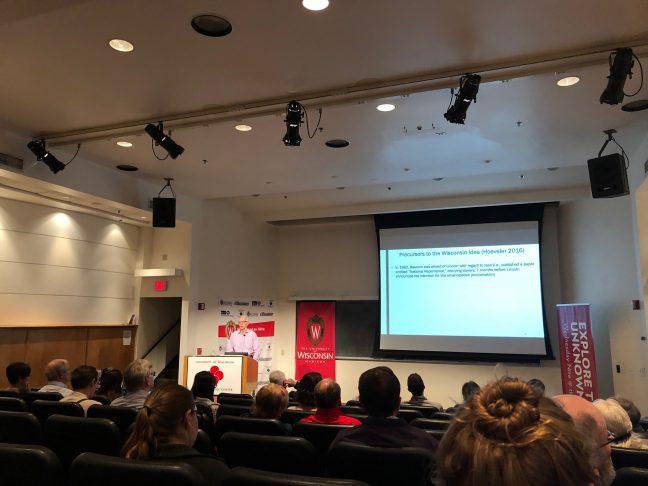University of Wisconsin professor of sociology Doug Maynard spoke on the importance of understanding autism spectrum disorder and making spaces more accessible to those with autism as a part of the Wisconsin Idea, Past and Present lecture series Tuesday night.
Maynard said this topic is relevant to the Wisconsin Idea because John Bascom, one of the originators of the Wisconsin Idea, was “attentive to the disadvantaged,” fought against slavery, advocated for the working class, supported women’s equality and tried to push UW to admit women, Maynard said this advocacy could be expanded autism.
Maynard said though the purpose of the Wisconsin Idea is that UW should serve the entire state and its people, UW has historically ignored certain groups of people. This includes those with disabilities and specifically those with autism.
In order to be more inclusive of the autistic community, UW needs to ensure there are interactions between neurotypical people and people with autism, Maynard said. To do this, Maynard said, neurotypical people need to be more patient of behavior they are unfamiliar with.
“My approach with regard to autism, taking an interactional approach, is that its behavior that disrupts or breeches common sense,” Maynard said. “We could say that it makes the familiar become strange because this behavior can threaten our notions of common sense.”
Neurotypical people often become upset when common sense is not used, Maynard said. To overcome this they must “make the familiar strange,” meaning neurotypical people must become more understanding of behavior that seems to go against common sense.
Maynard said it is the responsibility of neurotypical people to become more patient and understanding because they occupy a privileged space. Those who act in accordance with common sense are privileged because their behavior is accepted simply because it is common, he said.
“A job of the university is to teach individuals how to learn about differences by crossing over into the unfamiliarity of another person’s world and I just think that we’re not on equal terrain if we’re wanting to do this, there are people who occupy privileged statuses,” Maynard said.
Maynard said this understanding of autism diagnosis is important now more than ever as the prevalence of individuals diagnosed with autism is on the rise. Maynard said that when he asks his students if they know anyone with autism, the majority of the class raises their hand whereas ten years ago almost no one did.
Regardless of the cause of this influx, UW has a responsibility to support the growing number of students entering the university with autism, Maynard said. Maynard’s research focuses on studying interactions and much of it involves examining tapes of autism tests. He said we should look into making the diagnosis process better.
Current diagnosis inventories for autism focus on deficits, Maynard said he wants them to focus more on the unique behaviors of each individual that they can build upon.
“Autism isn’t going away, autism diagnosis is not going away, how can we make it a better process that deals with the individual child,” Maynard said.


